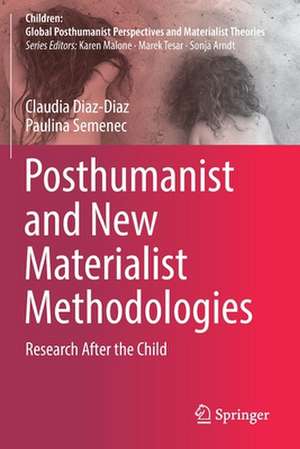Posthumanist and New Materialist Methodologies: Research After the Child: Children: Global Posthumanist Perspectives and Materialist Theories
Autor Claudia Diaz-Diaz, Paulina Semenecen Limba Engleză Paperback – 14 mar 2021
The book reflects on how posthumanist and materialist approaches have informed research in relation to de-centering the child, re-thinking methodological concepts of voice, agency, data, analysis and representation. It also explores what the future of research after the child might entail and offers suggestions to new and emerging scholars involved in research with children.
Reviewing how posthumanist and materialist approaches have informed authors’ thinking about children, research and knowledge production, the book will appeal to graduate students and emerging scholars in the field of childhood studies who wish to experiment with posthumanistmethodologies and materialist approaches.
| Toate formatele și edițiile | Preț | Express |
|---|---|---|
| Paperback (1) | 637.93 lei 6-8 săpt. | |
| Springer Nature Singapore – 14 mar 2021 | 637.93 lei 6-8 săpt. | |
| Hardback (1) | 644.18 lei 6-8 săpt. | |
| Springer Nature Singapore – 14 mar 2020 | 644.18 lei 6-8 săpt. |
Preț: 637.93 lei
Preț vechi: 750.50 lei
-15% Nou
Puncte Express: 957
Preț estimativ în valută:
122.07€ • 125.93$ • 101.87£
122.07€ • 125.93$ • 101.87£
Carte tipărită la comandă
Livrare economică 27 martie-10 aprilie
Preluare comenzi: 021 569.72.76
Specificații
ISBN-13: 9789811527104
ISBN-10: 9811527105
Ilustrații: XX, 224 p. 13 illus., 3 illus. in color.
Dimensiuni: 155 x 235 mm
Greutate: 0.35 kg
Ediția:1st ed. 2020
Editura: Springer Nature Singapore
Colecția Springer
Seria Children: Global Posthumanist Perspectives and Materialist Theories
Locul publicării:Singapore, Singapore
ISBN-10: 9811527105
Ilustrații: XX, 224 p. 13 illus., 3 illus. in color.
Dimensiuni: 155 x 235 mm
Greutate: 0.35 kg
Ediția:1st ed. 2020
Editura: Springer Nature Singapore
Colecția Springer
Seria Children: Global Posthumanist Perspectives and Materialist Theories
Locul publicării:Singapore, Singapore
Cuprins
Introduction.- Part 1 From the individual to the collective.- Interview with Sonja Arndt.- Interview with Mindy Blaise & Veronica Pacini-Ketchabaw.- Interview with Bronwyn Davies.- Interview with Hillevi Lenz Taguchi.- Interview with Jayne Osgood.- Interview with Margaret Somerville.- Part 2 Recreating and Tracing Childhoods.- Interview with Sylvia Kind.- Interview with Karin Murris.- Interview with Casey Y. Myers.- Interview with Pauliina Rautio.- Interview with Christopher Schulte.- Interview with Marek Tesar.- Part 3 Situating Children's Lives.- Interview with Iris Duhn.- Interview with Riika Hohti.- Interview with Peter Kraftl.- Interview with Karen Malone.- Interview with Fikile Nxumalo.- Interview with Affrica Taylor.- Afterword.
Notă biografică
Claudia Diaz-Diaz is a Ph.D. in Educational Studies at The University of British Columbia (UBC), Canada. Claudia received her Hons. BA in Psychology from the Universidad de Valparaíso, Chile (2001) and her M.Ed. in Early Childhood Education from UBC (2013). Her research interests include neoliberal approaches to educational policy, social pedagogies, childhood studies, and critical place methodologies. She has worked as an educational consultant and manager of poverty-reduction programmes in Chile. She is currently a UBC Public Scholar and a Scholar at the Liu Institute for Global Issues. She received the Janusz Korczak Scholarship for her work on children’s rights and the Margaret and Peter Lukasevich Memorial Prize in Early Childhood Education. Claudia is currently a sessional instructor in the Teacher Education Program at UBC.
Textul de pe ultima copertă
This book features interviews with 19 scholars who do research with children in a variety of contexts. It examines how these key scholars address research 'after the child’ by exploring the opportunities and challenges of drawing on posthumanist and materialist methodologies that unsettle humanist research practices.
The book reflects on how posthumanist and materialist approaches have informed research in relation to de-centering the child, re-thinking methodological concepts of voice, agency, data, analysis and representation. It also explores what the future of research after the child might entail and offers suggestions to new and emerging scholars involved in research with children.
Reviewing how posthumanist and materialist approaches have informed authors’ thinking about children, research and knowledge production, the book will appeal to graduate students and emerging scholars in the field of childhood studies who wish to experiment with posthumanist methodologies and materialist approaches.
The book reflects on how posthumanist and materialist approaches have informed research in relation to de-centering the child, re-thinking methodological concepts of voice, agency, data, analysis and representation. It also explores what the future of research after the child might entail and offers suggestions to new and emerging scholars involved in research with children.
Reviewing how posthumanist and materialist approaches have informed authors’ thinking about children, research and knowledge production, the book will appeal to graduate students and emerging scholars in the field of childhood studies who wish to experiment with posthumanist methodologies and materialist approaches.
Caracteristici
Uses accessible language and an engaging interview format featuring 19 key and emerging scholars from various parts of the world who conduct research with children Includes critical discussions on current methodological and ontological issues related to research with children Offers diverse perspectives on research methodology with children for graduate students and scholars interested in learning more about post humanist and new materialist methodologies











